WordPress powers hundreds of millions of websites.
But, when issues happen internally at WordPress raising uncertainty, the vulnerability of relying on one platform becomes apparent and the need to look for alternatives is a priority.
WordPress it is not the only content management system (CMS) option. There’s a diverse marketplace of publishing platforms for those seeking alternatives.
This review provides an overview of 24 leading WordPress alternatives across key website categories. We explore user-friendly website builders which offer drag-and-drop simplicity. And, we look at flexible open-source options for developers and tech-savvy users. We also cover blogging-focused options, web hosting providers, and community management tools.
For each alternative, we summarize the key features, benefits, and drawbacks to consider. Factors like budget, technical abilities, and website goals are examined to help identify the best fit based on individual needs. We also sifted through community feedback and reviews for each platform.
While WordPress powers a large share of sites, there’s no shortage of quality options for creating the perfect online presence.
24 Best WordPress Alternatives
1. Wix
Wix is best suited for individuals, small businesses, and entrepreneurs who want to create a professional-looking website without extensive technical skills or a large budget.
The platform’s user-friendly drag-and-drop interface makes it easy for users to design and customize their websites, offering various templates and design elements suitable for multiple purposes.
As a hosted platform, Wix takes care of technical aspects like server maintenance and security updates, making it ideal for those who don’t want to deal with these issues.
Wix also offers a free plan, allowing users to create a website without cost, although with limitations such as Wix branding and a non-custom domain.
One nuance to remember when using Wix is that once you’ve chosen a template and started building your site, it can be challenging to switch to a different template without redesigning your content.
Wix User Comments And Reviews
The general consensus is that Wix is great for beginners and small businesses, but if you’re an advanced user or growing business, you might find that you outgrow the capabilities of the platform.
In its YouTube review, StartupWise said that Wix is “one of the best website builders out there, especially if you want a very professional-looking website without spending a lot of time or needing to know how to create a website.”
In a recent post on Reddit, commenters praised Wix for beginner-friendly interfaces with professional results but warned of a lack of flexibility, SEO features, and the ability to export.
“Wix works well for straightforward websites where you don’t need a lot of advanced features. It’s beginner-friendly and has improved its SEO tools over the years, but it still doesn’t match the flexibility of platforms like WordPress.
The biggest issue is migration—you can’t take your site with you if you switch.” Prize-Complex-453 on Reddit.
“Wix is a good choice if you’re new to website building. The templates are professional, and the drag-and-drop interface is beginner-friendly.
However, if you’re planning to focus heavily on SEO or might need more customization down the line, it could feel limiting.” WilliamILaird on Reddit.
Key Features:
- Full hosting solution.
- No software to self-install.
- Drag-and-drop visual builder.
- Extensions are available.
- Optimized for mobile.
- Blog module.
- Ecommerce store.
- Social media tools.
Pros:
- All-in-one website builder and platform.
- Free version available.
- Premade designs and templates.
- Free subdomain available for all plans.
- Free custom domain available with paid plans.
- Customer support.
Cons:
- There is no option to retain complete control of your site as you can with WordPress.
- No access to source code.
2. Squarespace
 Screenshot of Squarespace.com, November 2024
Screenshot of Squarespace.com, November 2024Squarespace is best suited for creatives, bloggers, and small business owners who want to create visually stunning websites with minimal technical knowledge.
The platform is known for its sleek, modern templates, which showcase content beautifully and are optimized for mobile devices.
As an all-in-one platform, Squarespace includes hosting, domain registration, and various tools for managing your website.
While Squarespace offers a high degree of customization, it may not be as flexible as some alternatives. The platform has a specific structure and set of features, which can be limiting for those who require advanced functionality or integrations.
Nonetheless, for most users, Squarespace’s built-in features and integrations are more than sufficient.
One tip for getting the most out of Squarespace is to use its built-in SEO and marketing tools, such as custom meta descriptions, alt tags, and automatic sitemaps.
Squarespace User Comments And Reviews
Reviewers often praise how stylish and modern Squarespace is.
In its YouTube review, Cybernews said that while Squarespace is a little expensive and could have better technical performance, its award-winning designs are great for creatives, and its interface is great for beginners.
“I just love the Squarespace editor, it’s so minimalistic. … I can confidently recommend Squarespace for beginners.”
In its YouTube review, StyleFactory explained 5 pros and 5 cons of Squarespace, praising its ease of use and built-in ecommerce features but noting lack of some functionality in those same ecommerce features and connected apps.
Key Features:
- Complete hosting solution (including video).
- No software to self-install.
- Drag-and-drop visual builder.
- Extensions are available.
- Optimized for mobile.
- Blog module.
- Ecommerce store.
- Social media tools.
Pros:
- All-in-one website builder and platform.
- Free version available.
- Premade designs and templates.
- Free subdomain available for all plans.
- Free custom domain available with an annual subscription.
- Customer support.
Cons:
- There is no option to retain complete control of your site as you can with WordPress.
- No custom coding.
- No access to source code.
- No third-party extensions.
3. Google Sites
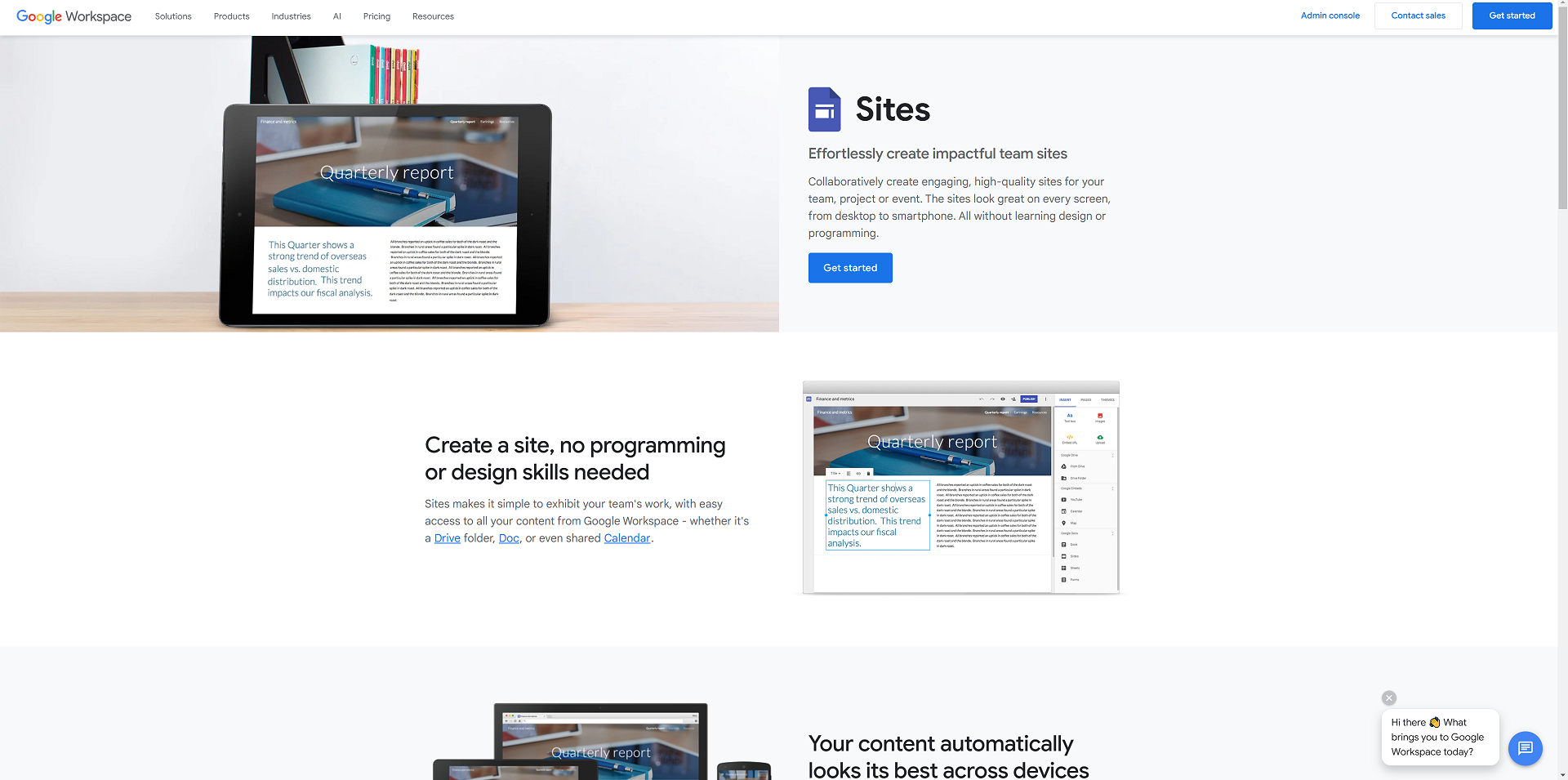 Screenshot of workspace.google.com, November 2024
Screenshot of workspace.google.com, November 2024Google Sites is best suited for individuals, educators, and small businesses who need a simple, easy-to-use platform for creating basic websites or intranets.
Its seamless integration with other Google tools, like Google Docs, Sheets, and Drive, makes it an excellent choice for those familiar with and heavily using these tools.
Google Sites also offers collaboration features, allowing multiple users to work on the same website simultaneously, making it ideal for team projects or class websites.
However, it’s a relatively basic website builder compared to other alternatives, with limited features and customization options. It may not be the best choice for those needing advanced functionality or design flexibility.
Additionally, it lacks built-in ecommerce features, making it less suitable for online stores.
One tip for getting the most out of Google Sites is leveraging its integration with other Google tools, such as embedding Google Docs, Sheets, or Slides into your web pages or using Google Forms to collect visitor data.
Google Sites User Comments And Reviews
Users praise the ease of use Google Sites provides, but mention that it is nowhere near as flexible and customizable as WordPress.
“On the other hand, Google Sites is completely free and you can use it with a free subdomain from Google or your own custom domain name. The interface is much simpler and easier to use for a total beginner. No need to pay for hosting or worry about any server-side issues, updates, security, etc.
But Google Sites offers very limited options for your site’s design, and it’s much less customizable than WordPress.” ZGeekie on Reddit.
“I am loving the simplicity of Google sites, crafting a basic page with links to my Etsy and a newsletter signup within a couple of days.” Netty4 on Reddit.
Key Features:
- The creator has complete control over page access and permissions.
- Tools can be accessed anywhere.
- It can be used as a basic project management program.
- Plenty of web development and deployment options.
- Real-time editing.
- Uses website speed optimization tools to minimize loading times.
Pros:
- Fast to get started and easy to use.
- Free to use.
- Integrated with other Google products.
Cons:
- Limited functionality compared to other website builders.
- It may not work with non-Google apps.
- Limited customization options.
- No SEO tools, and you can’t edit metadata.
- It cannot integrate Facebook pixels.
4. Jekyll
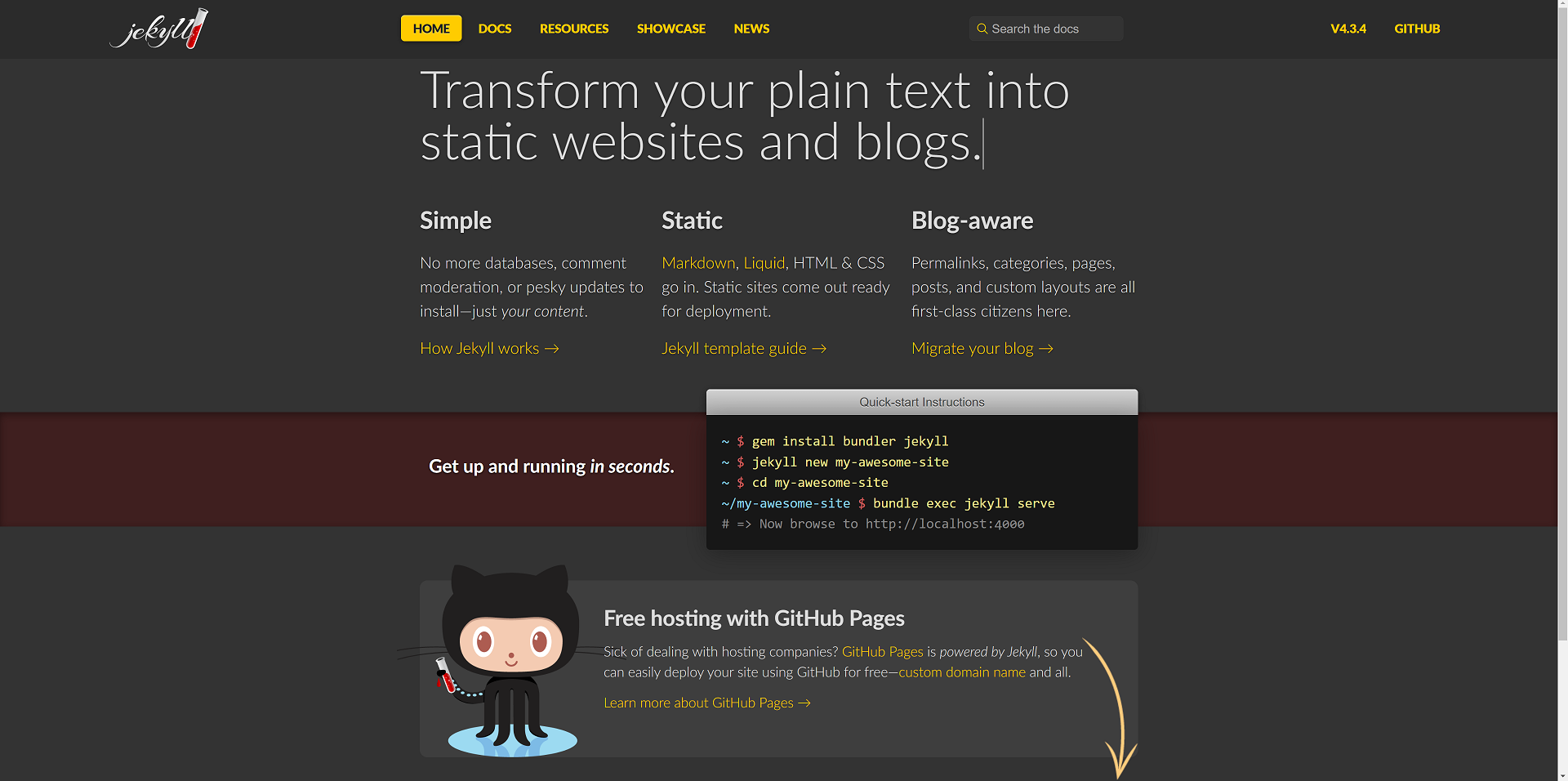 Screenshot of jekyllrb.com, November 2024
Screenshot of jekyllrb.com, November 2024Jekyll is best suited for developers, bloggers, and tech-savvy individuals who prefer a lightweight, flexible website creation platform. It’s particularly popular among the GitHub community, as it can be easily integrated with GitHub Pages for free hosting.
Jekyll requires specific technical knowledge, as users must be comfortable working with the command line and writing code. While Jekyll offers plugins and themes to extend its functionality, users may need to rely on their coding skills to customize their website fully.
One tip for getting the most out of Jekyll is to utilize its built-in blogging features, which offer a simple, intuitive way to create and manage blog posts using Markdown.
Another nuance to remember is that Jekyll generates static pages that may not be the best choice for websites requiring frequent updates or complex functionality.
Key Features:
- No programming is involved.
- SEO is built-in.
- GitHub manages redirects.
- Easy setup of custom domains.
Pros:
- No server maintenance.
- Very fast.
- Secure.
- Free hosting.
- Free SSL certificate.
- Works with GitHub as CMS.
Cons:
- It can’t create contact forms.
- No dynamic content options.
- Posts cannot be scheduled.
- Does not include image manipulation functionality.
5. Hugo
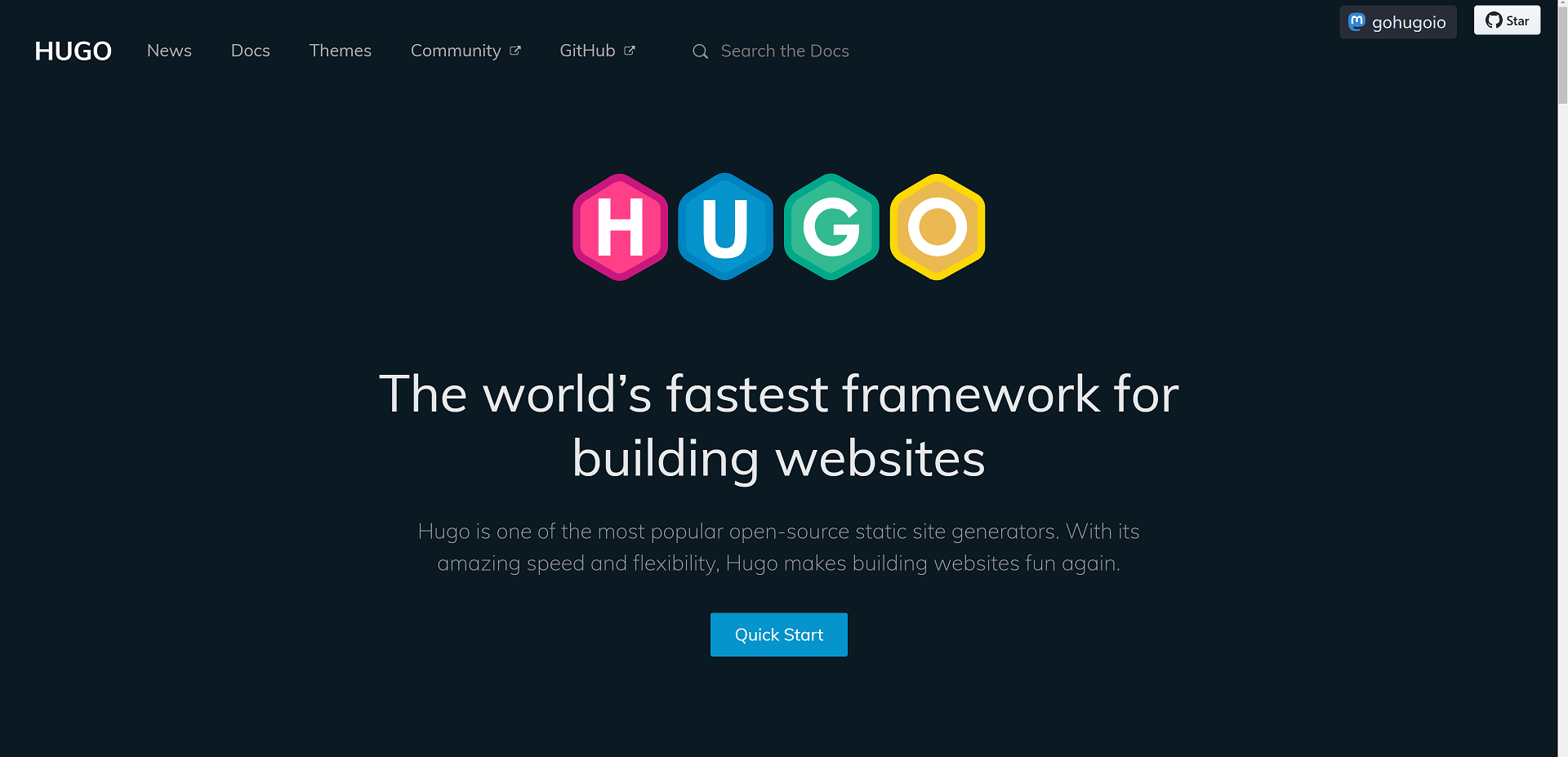 Screenshot of gohugo.io, November 2024
Screenshot of gohugo.io, November 2024Hugo is best suited for developers, bloggers, and content creators who value speed, flexibility, and simplicity.
Its lightning-fast build times and static page generation make it ideal for those who frequently update their site or publish new content regularly.
While Hugo offers themes and templates to help users get started, creating a unique design may require coding skills.
One tip for getting the most out of Hugo is to leverage its built-in shortcodes, which allow users to easily add complex functionality to their web pages without writing extensive code.
Another nuance to remember is that, as a static site generator, Hugo may not be the best choice for websites that require dynamic features like user authentication or real-time data updates.
Hugo User Comments And Reviews
In his YouTube Video, Luke Smith explains why Hugo is so customizable and extendable.
Users on Reddit praise Hugo for security and customizability, but some users note that it is not a good choice for e-commerce.
“Learning curve is steep in comparison to WordPress, but once you understand static site generators the choice is easy: SSGs are fast, lightweight, need no updating and protecting whatsoever (a WordPress site on the other hand is very likely to get breached/hacked/Powned at one point, especially if you forget to update all components. And auto updates sometimes break functionality so that’s not a smart option)” iroQuai on Reddit.
Key Features:
- Can build most websites in seconds.
- Cross-platform with easy installation.
- Allows you to host your site anywhere.
- Customizable URLs.
- “Minutes to Read” and “WordCount” functionality.
- Integrated Google Analytics and Disqus comment support.
Pros:
- It easily integrates with Google Calendar and other apps.
- Easy to use with responsive customer service.
- Multilingual capabilities are built-in.
- Extendable as needed.
Cons:
- It can’t create one-off tasks.
- It can be confusing upon initial use, particularly in templating syntax.
- No plugins are available.
- Limited text formatting features.
6. Webflow
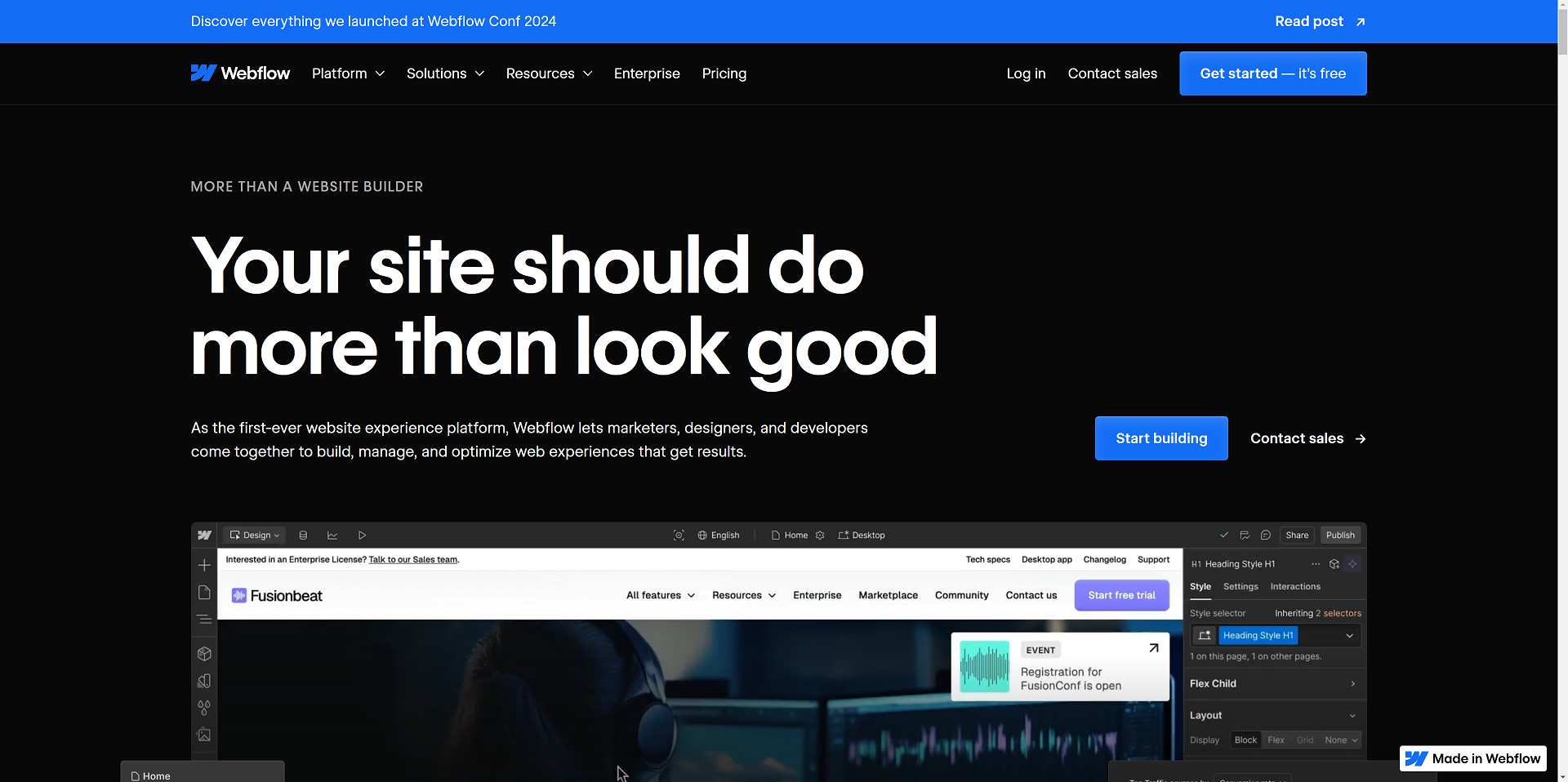 Screenshot of webflow.com, November 2024
Screenshot of webflow.com, November 2024Webflow is best suited for freelance designers and small agencies who want complete control over their website’s design without worrying about hosting, security, or performance.
One nuance of Webflow is that extending a site’s functionality is not as straightforward as installing a plugin like WordPress.
Users must either set up integrations between their Webflow site and other platforms using third-party tools like Zapier, or they can embed custom code blocks on pages to add features.
A key aspect to note about Webflow is its pricing structure. Building a site is completely free, and users only need to purchase a site plan and custom domain when they are ready to launch.
This makes it an attractive option for freelancers and small teams who want to design and prototype sites without upfront costs, paying only when they are ready to go live.
Webflow User Comments And Reviews
In his YouTube video, My First Website says:
“There is no tool virtually out there that allows you to have the same kind of customization without any programming knowledge. Simply put, on Webflow you can practically build anything. However, the whole experience does come at a pretty steep learning curve.”
On Reddit, users admit that Webflow can be difficult to use, but often say that the additional learning curve is worth it:
“I’d much rather pay for Webflow than encounter the frustrations of working on a platform like WordPress. I think coming from your design background you’ll very much appreciate the tools at your disposal.” Ok-Site-3047 on Reddit.
However, users don’t recommend Webflow for e-commerce:
“Quite frankly, it’s gotten to the point where if you are looking at Webflow as a potential solution for your ecom company’s needs because “it’s almost perfect”, and you’re thinking that the basic features you need will be there eventually, be wary. ” wherethewifisweak on Reddit.
Key Features:
- More than 100 templates to choose from.
- Design is prioritized, with animation, interaction, and parallax scrolling options.
- Offers automatically generated sitemaps and customizable 301 redirects.
- Multiple payment options for ecommerce sites and automatic tax calculation.
Pros:
- Affordable plans range from free to $235 for top-tier ecommerce plans.
- Free starter plan.
- Numerous learning and help resources.
- Good range of templates.
- Good security.
Cons:
- Steep learning curve.
- Integration with social media can be frustrating.
- Advanced capabilities aren’t built-in and require integration.
7. Joomla
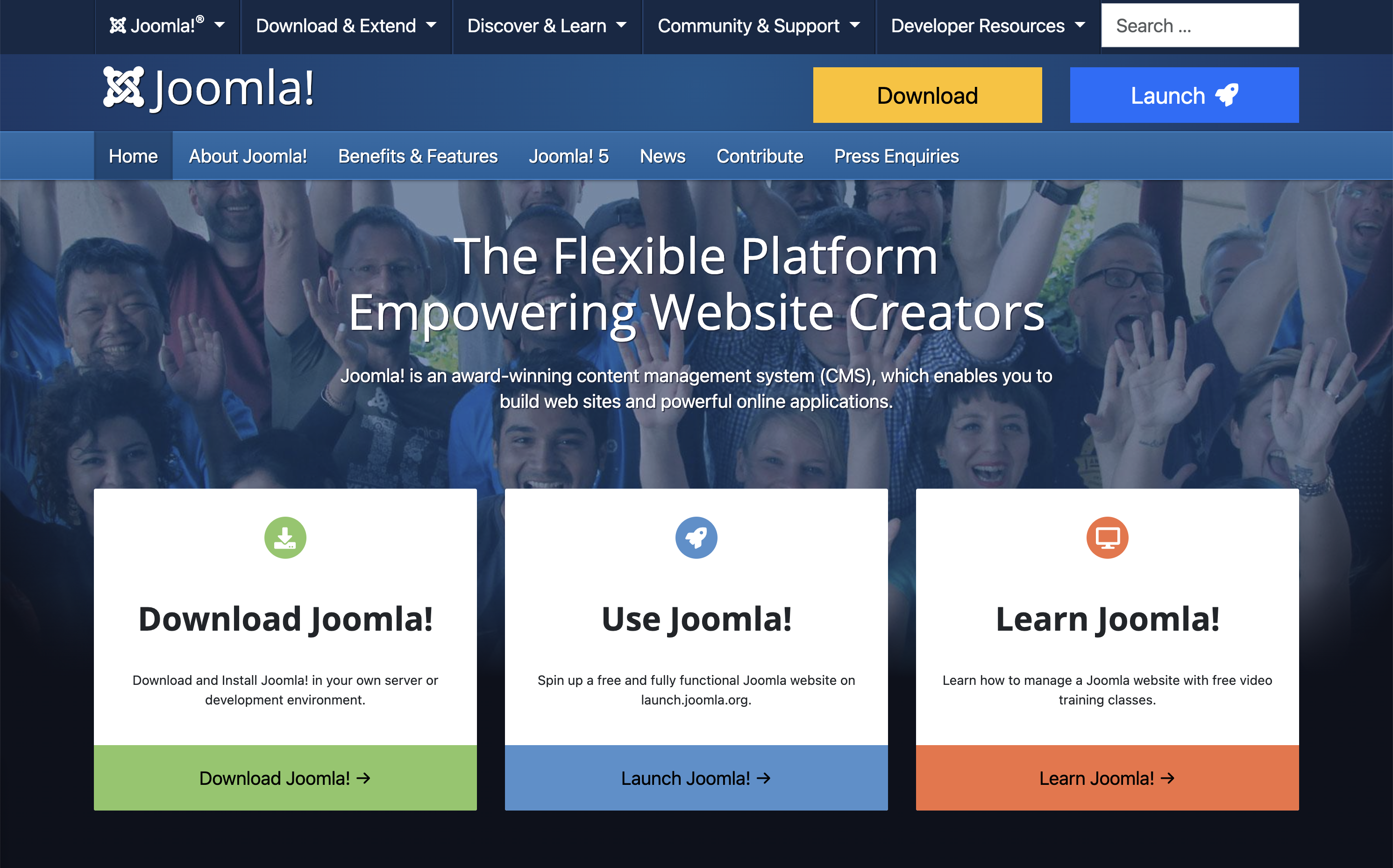 Screenshot of joomla.org, November 2024
Screenshot of joomla.org, November 2024Joomla is best suited for creating social networking, community, and membership sites.
With its built-in multilingual support and advanced user and content management options, Joomla enables site owners to manage hundreds of users, create custom post types, and publish content in multiple languages.
One nuance of Joomla is that it has a steeper learning curve compared to a more beginner-friendly CMS like WordPress.
While Joomla aims to combine the power and flexibility of Drupal with the user-friendliness of WordPress, users with some web development experience will be better equipped to understand and take full advantage of Joomla’s built-in features and settings.
Users can choose from over 6,000 extensions available in the official directory to extend a Joomla site’s functionality. However, unlike WordPress plugins that can be installed with just a few clicks, Joomla extensions must be installed via the backend.
This process requires more technical know-how and may be challenging for beginners.
Joomla User Comments And Reviews
In its YouTube video, WebTech with Brett, the channel preferred the user experience of Joomla. In comparison to WordPress, found the two platforms almost equal in performance, giving an edge to Joomla for slightly faster loading times.
On Reddit, Joomla doesn’t seem to have a large community, but users say it does what it’s built to do well.
“WP has a much larger user base and therefore more themes, plugins, tutorials, and so on. It also makes it a larger target for security concerns.” donutjudgememe on Reddit.
Key Features:
- Almost 6,000 extensions are available.
- Traditional content editing (no drag-and-drop visual editor).
- Optimized for mobile (depending on the template).
- Blog module.
- Ecommerce store.
- Social media tools.
Pros:
- Free, open-source software.
- Premade designs and templates.
- Access to source code.
Cons:
- No free subdomains or custom domains are available.
- No customer support.
- Requires a PHP-enable server to run.
- Fewer templates and extensions than WordPress.
8. Drupal
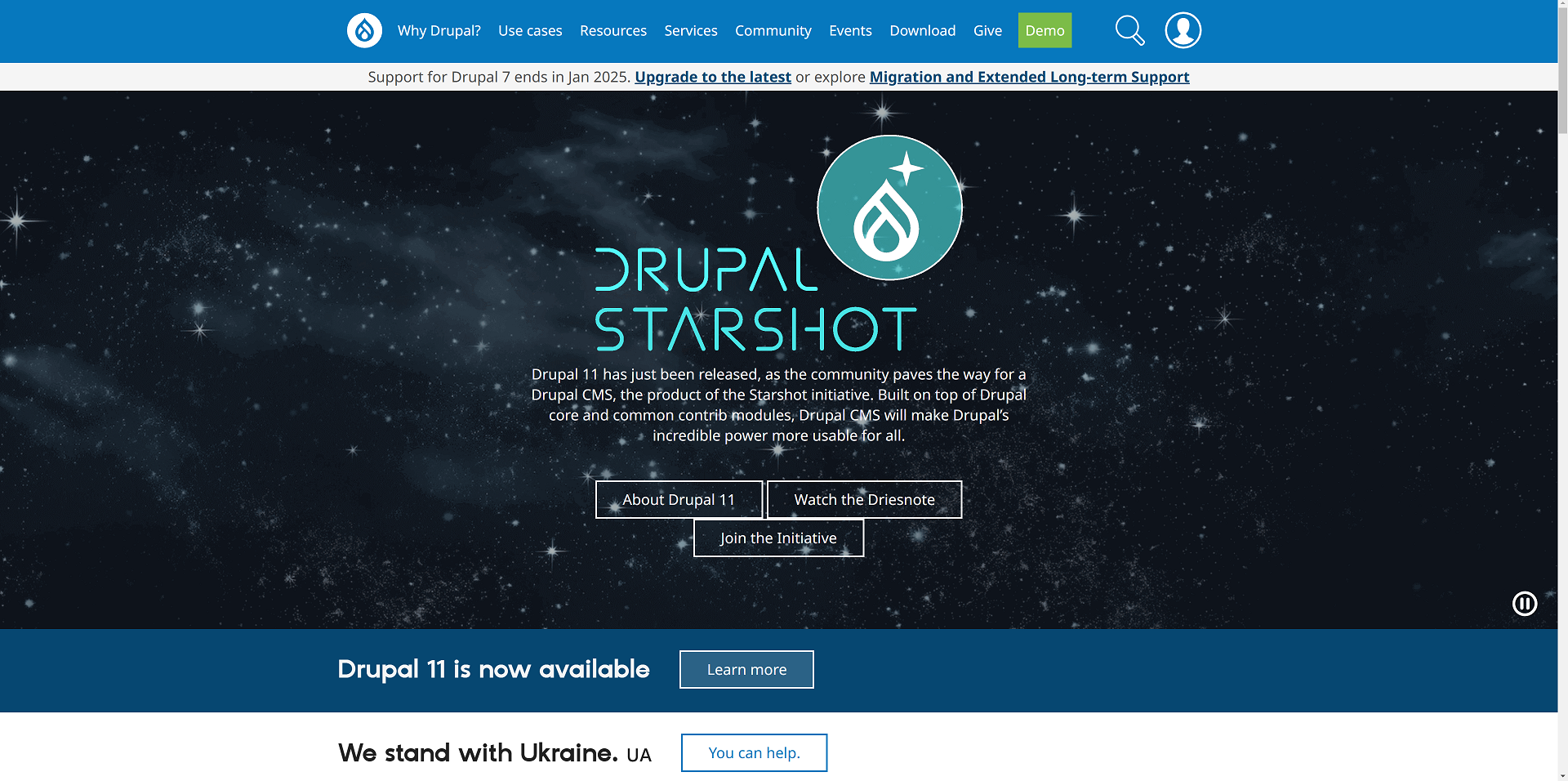 Screenshot of www.drupal.org, November 2024
Screenshot of www.drupal.org, November 2024Drupal is best suited for large corporations, government agencies, and universities with dedicated teams of developers.
With its extensive customization options and ability to handle large data and heavy traffic, Drupal is ideal for complex, high-performance websites.
One key nuance of Drupal is its steep learning curve. Drupal is designed for developers or users with a strong understanding of HTML, CSS, and PHP.
Customizing a Drupal site involves working with numerous modules and themes, which can be highly configurable but require technical expertise to set up and maintain.
For organizations with the necessary technical resources, Drupal’s flexibility and robustness make it a top choice for building highly secure and customized websites.
However, Drupal recently released Drupal 11, called Starshot, which is advertised as a more easily usable CMS. This could make the platform much more approachable and user-friendly for beginners.
Drupal User Comments And Reviews
On Reddit, users often note that Drupal is for advanced users with complex needs. If you don’t need to do the advanced functions it allows, then it may not be worth it to learn the code languages required.
“However, IF you have time, patience, and LOVE to learn, then go for it. I love Drupal … but it does come with a few headbanging on the keyboard moments .. lol…” Mangapink on Reddit.
“Drupal is not a good fit for static brochure and marketing sites and it’s probably not worth it for a blog either unless you already know what you’re doing. Drupal only makes sense when you need a lot of custom functionality that you won’t find as a feature in prepackaged solutions.” This_Bandicoot17 on Reddit.
However, Drupal does have a passionate and supportive community. Users note its power for advanced functions, structured data, and security.
“Learning Drupal can be great because in the process, you will also learn other tech that is highly marketable like • Front End: Twig, CSS, JavaScript and sometimes React • Back End: Symfony, YML, JSON and REST API, MySQL • DevOps: DDev, GitLab Pipelines, GitHub Actions, and sometimes Kubernetes, Terraform and Jenkins” tekNora on Reddit.
“Drupal is becoming stronger than ever. One of its major strengths is the integration of Symfony components. The community is driving innovation, resulting in impressive work that you won’t find in WordPress.” friedinando on Reddit.
Key Features:
- Content management system (CMS).
- Over 47,000 modules are available.
- Traditional content editing (no drag-and-drop visual editor).
- Optimized for mobile (depending on the theme you choose).
- Blog module.
- Ecommerce store.
- Social media tools.
Pros:
- Free, open-source software.
- Premade designs and templates.
- Access to source code.
- Strong security and data encryption.
Cons:
- No free subdomains.
- No customer support.
- Requires a PHP-enabled server to run.
9. DataLife Engine
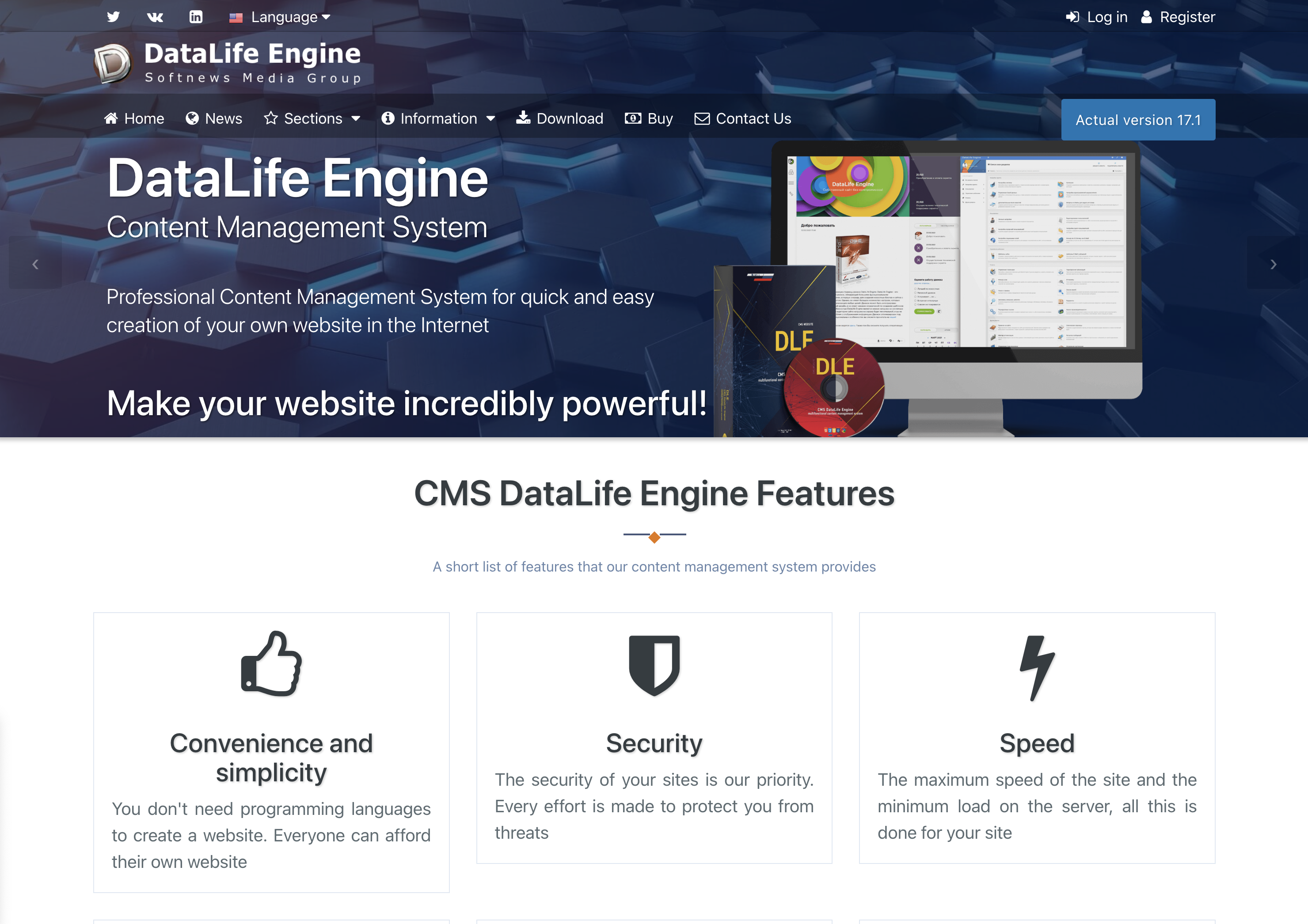 Screenshot of dle-news.com, November 2024
Screenshot of dle-news.com, November 2024DataLife Engine (DLE) is best suited for media companies, news websites, and blogs, prioritizing SEO, security, and performance.
The platform’s focus on handling high traffic levels with minimal server load makes it an attractive choice for websites that expect significant visitors and must ensure a smooth user experience.
DLE’s user-friendly interface and content management features suit organizations with multiple users involved in creating and publishing well-suited content.
The platform’s ability to track statistics and automatically filter words in comments can benefit media websites and blogs that need to moderate user-generated content and analyze audience engagement.
However, there are some nuances to consider when using DLE. The limited number of plugins and themes may restrict how much websites can customize their appearance and functionality compared to other CMSs like WordPress.
It’s also important to note that while DLE supports English users, they are considered a secondary focus.
Key Features:
- Content management system (CMS).
- Designed for multiple users.
- SEO-focused.
- Tracks statistics.
- Automatically filters words in comments.
- It supports an unlimited number of categories.
- Low server load.
- Allows plugins.
Pros:
- Stores data using MySQL.
- Excellent user experience
- Websites load quickly, even on low-end servers.
- Excellent for publishing news and blog posts.
Cons:
- No free version. Licenses vary from $79 for basic to $199 for unlimited.
- English users are a secondary focus.
- A limited number of plugins and themes.
- The lowest license doesn’t include customer support.
10. Sitefinity
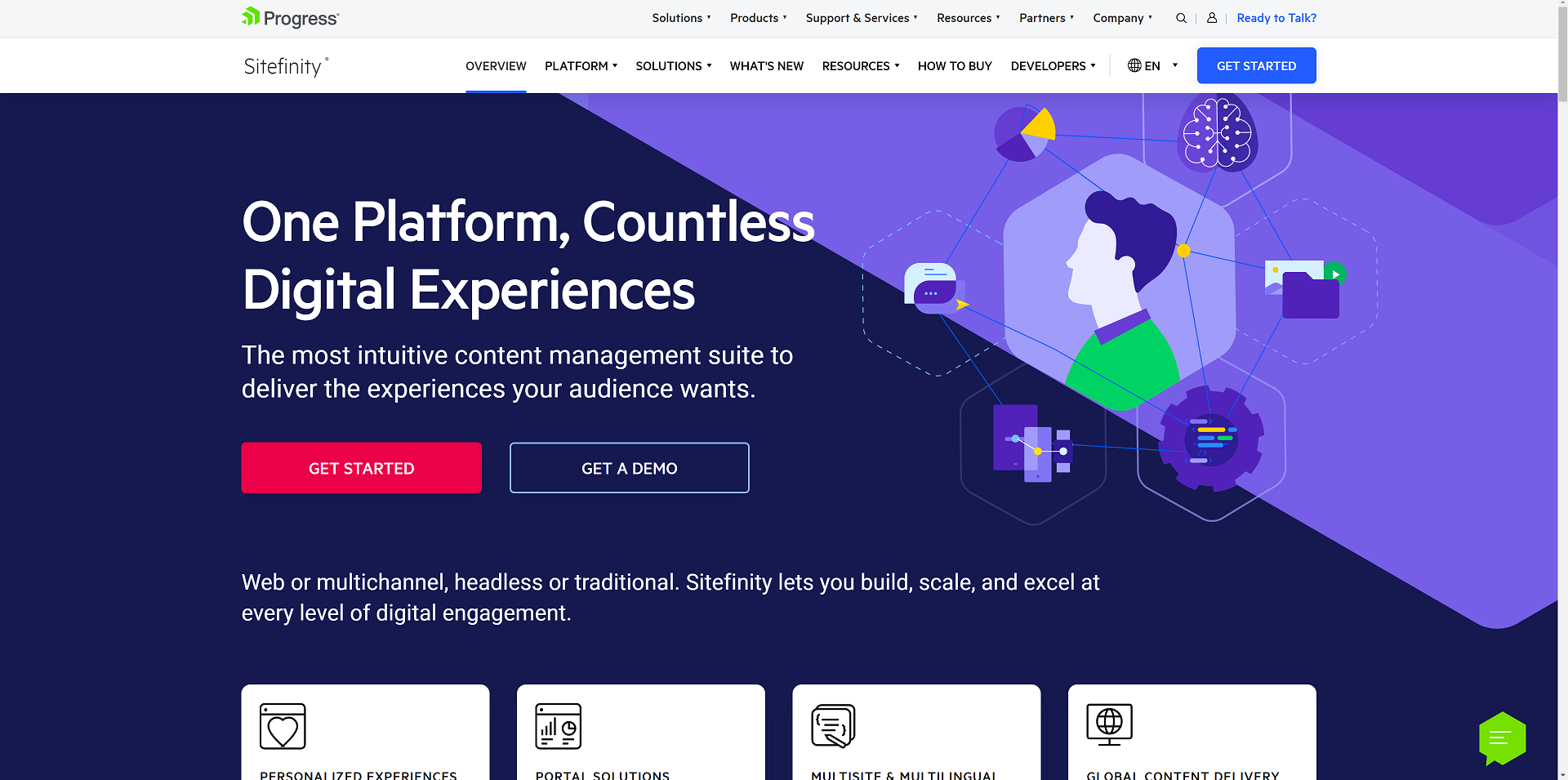 Screenshot of www.progress.com/sitefinity-cms, November 2024
Screenshot of www.progress.com/sitefinity-cms, November 2024Progress’ Sitefinity is best suited for organizations that manage multiple websites, brands, or marketing channels from a single platform.
The CMS’s ability to sync assets across pages and sites makes it an attractive choice for companies with a diverse online presence. It streamlines content management and ensures consistency across various touchpoints.
One notable advantage of Sitefinity is its low-cost license compared to other CMS options, which may make it an attractive choice for budget-conscious organizations.
Additionally, the minimal coding required for integration and the flexible deployment time can help businesses reduce development costs and bring their websites to market faster.
However, Sitefinity setup and administration can be challenging. Organizations may need to invest time and resources into training their teams or hiring experienced professionals to ensure a smooth implementation and ongoing management of the platform.
Key Features:
- Manage multiple sites from one location.
- Sync assets across pages and sites.
- It makes personalization simpler.
- Integrated analytics and optimization.
- Four versions include basic, marketing-focused, PaaS, and ecommerce.
- Multilingual capabilities.
Pros:
- Low-cost license compared to other CMS.
- No setup fee.
- Minimal coding is required for integration.
- Flexible deployment time shortens time to market.
- Options for marketing automation.
Cons:
- Free trial, but no free version.
- Setup and administration can be challenging.
- No mobile interface.
11. HubSpot CMS Tools
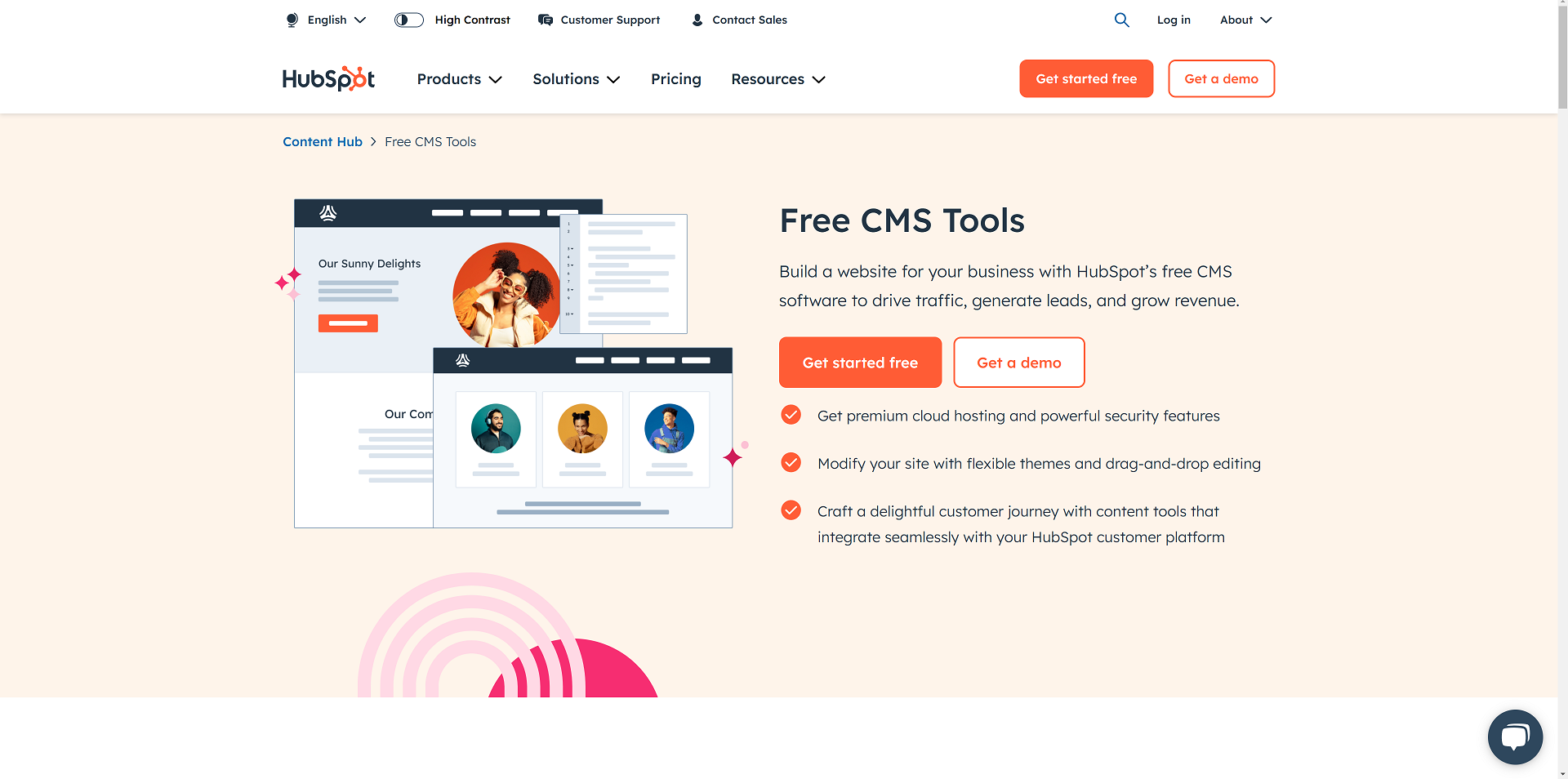 Screenshot of www.hubspot.com/products/cms, November 2024
Screenshot of www.hubspot.com/products/cms, November 2024HubSpot’s free CMS is best suited for businesses that already use HubSpot’s marketing, sales, or service tools and want to integrate their website with their existing HubSpot ecosystem.
It combines the ease of use of a drag-and-drop website builder with the flexibility and performance of a CMS.
The CMS tools seamlessly integrate with HubSpot’s CRM platform, allowing businesses to create personalized content experiences, optimize marketing efforts, and streamline sales processes.
It also focuses on security and performance, with HubSpot handling website hosting, SSL certification, and CDN configuration.
However, while HubSpot offers customization options, it may not be as flexible as other CMS platforms like WordPress or Drupal, potentially limiting businesses with particular design or functionality requirements.
Additionally, HubSpot’s pricing model can be expensive compared to other CMS options, so companies must carefully consider their budget and weigh the benefits of its all-in-one approach.
Hubspot User Comments And Reviews
User on Reddit recommend Hubspot for situations where integration is a critical factor, but advise against using it if you won’t make full use of the features and integrations due to the expense and difficulty in development.
“It all depends on your goals with your website. If you’re just putting up a catalog/billboard website, then don’t pay for HubSpot CMS.
If you want to treat your website like the customer experience “home base” for the entire customer journey, serving up dynamic, value-focused experiences based on data, choose HubSpot.” profoundly_chris on Reddit.
“If you want a crazy deep integration between your website and crm, maybe build on hubspot. Maybe.
But if you want a better website, build on WordPress.” ChiefMustacheOfficer on Reddit.
Key Features:
- Cloud-based.
- Includes SEO recommendations.
- Includes numerous themes and responsive templates.
- Fully integrated CRM.
- Drag-and-drop webpage editor.
- Built-in security.
Pros:
- Adaptive A/B testing helps you identify the best page layout.
- All-in-one publishing tools.
- Built-in SEO tools.
- Supports smart content with personalized rules.
- Mobile pages supported with Google AMP.
Cons:
- Does not support ecommerce.
- No automatic backup and recovery.
12. Contentful
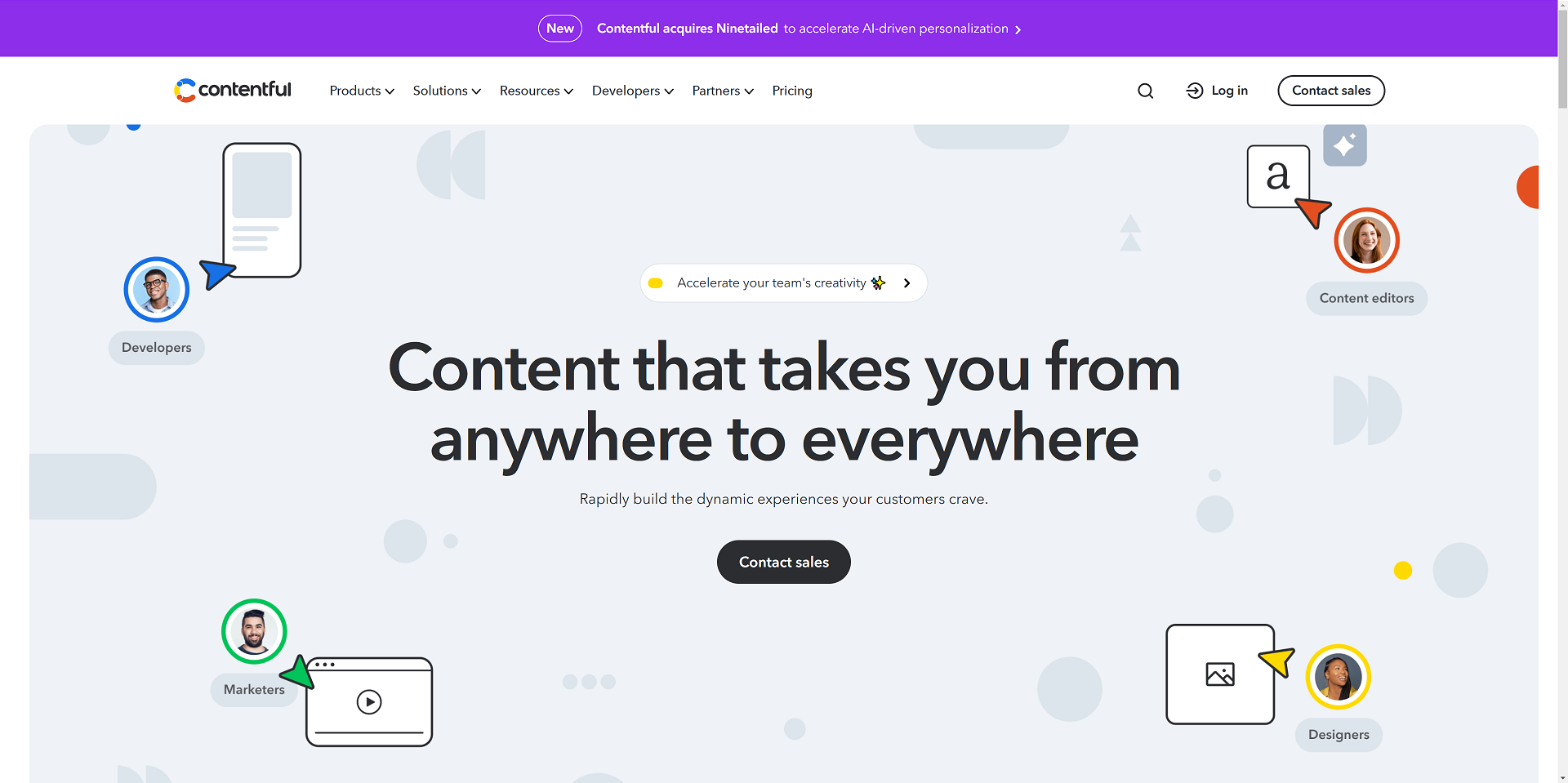 Screenshot of www.contentful.com, November 2024
Screenshot of www.contentful.com, November 2024Contentful is a headless CMS best suited for businesses and developers requiring a flexible, scalable, and customizable content management solution.
It’s particularly well-suited for organizations delivering content across multiple channels, such as websites, mobile apps, and IoT devices.
One of Contentful’s key advantages is its content modeling capabilities. The platform allows users to create custom content models that can be easily adapted to their needs.
When using Contentful, it’s important to remember that it’s a headless CMS that focuses on content management and delivery rather than providing a built-in front end or presentation layer.
Developers must build a front end using their preferred tools and frameworks and then integrate with Contentful’s API to retrieve and display the content.
Another aspect to consider is the learning curve associated with Contentful. While the platform is designed to be user-friendly, it may take some time for content editors and managers to become familiar with its interface and content modeling concepts.
Contentful User Comments And Reviews
Users on Reddit praise Contentful but warn of the high price and development needs.
“Contentful is solid but gets extremely expensive. It has a lot of features and flexibility in content modeling but again the price can get very hefty.” nate-developer on Reddit.
“I am sure every case is different but Contentful websites require so much custom development you need to have the resources to make it work.” conleyc86 on Reddit.
Features:
- RESTful API gives you complete control over assets, translations, and versions.
- Customizable interface and framework that works across third-party component providers.
- It provides regional autonomy, so pieces in multiple languages and time zones can be published globally.
- Content modeling allows you to structure content by channel.
- Single sign-on and secure access.
Pros:
- Focus on integration simplifies the technology stack.
- User-friendly with a clean interface.
- Free version for up to five users.
- Good scalability.
Cons:
- Expensive for an upgraded version ($489/month).
- Poor internal search tools.
- Modeling content can be tricky.
13. Adobe Experience Manager
 Screenshot from: business.adobe.com/products/experience-manager/adobe-experience-manager.html, November 2024
Screenshot from: business.adobe.com/products/experience-manager/adobe-experience-manager.html, November 2024Adobe Experience Manager (AEM) is an enterprise-level CMS best suited for large organizations with complex content management needs and a significant budget. AEM’s target audience includes global brands, financial institutions, healthcare providers, and government agencies.
One of AEM’s key strengths is its tight integration with other Adobe products, such as Analytics, Target, and Creative Cloud.
This integration allows organizations to leverage the full power of Adobe’s digital marketing suite, enabling them to create, manage, and optimize content and experiences across the entire customer journey.
AEM also offers advanced features like intelligent content delivery, AI-powered content tagging, and multi-site management, making it a comprehensive solution for enterprise content management.
The platform’s complexity and extensive feature set can overwhelm smaller organizations or teams with limited resources. Additionally, AEM’s licensing and implementation costs are among the highest in the market, making it a significant investment for any organization.
Adobe Experience Manager User Comments And Reviews
On Reddit, users note that Adobe Experience Manager is commonly used by large enterprises but due to its complexity and the specialized skills required, even those large organizations find it difficult to work with. Because of this, learning to use it could be a good idea for developers who want to get into enterprise work.
“I have many large corporate clients that use AEM. But they all hate it. They hire me to come in and build WordPress-based microsites because doing anything custom in AEM takes forever. It takes forever because there’s few devs out there that know it.” HaddockBranzini-II on Reddit.
“AEM is an enterprise-level CMS, meaning only the largest websites would consider it. It’s expensive and requires devs with specialized skills, so a company typically only chooses it if smaller CMSes like Drupal and WordPress could never meet their needs.” pulpexploder on Reddit.
Key Features:
- Comprehensive marketing platform.
- End-to-end digital document solution.
- Enterprise-level security.
- Analytics included.
- Intelligent search.
- Scalable to your needs.
Pros:
- Streamlines workflows by keeping everything on one platform.
- Individual marketers can handle authoring and publishing.
- Easy authorization of workflow.
- Can handle massive content loads.
- Can manage multiple sites at once.
Cons:
- Steep learning curve.
- Requires different sign-ins to access other areas.
- Doesn’t integrate well with external DAMs.
- Not ideal for communities and forums.
Ecommerce Platforms
Platforms built specifically for ecommerce can make managing your website a lot easier if that’s your focus.
Ecommerce platforms prioritize the functionality you need to build and manage online stores and optimize your conversion performance.
14. BigCommerce
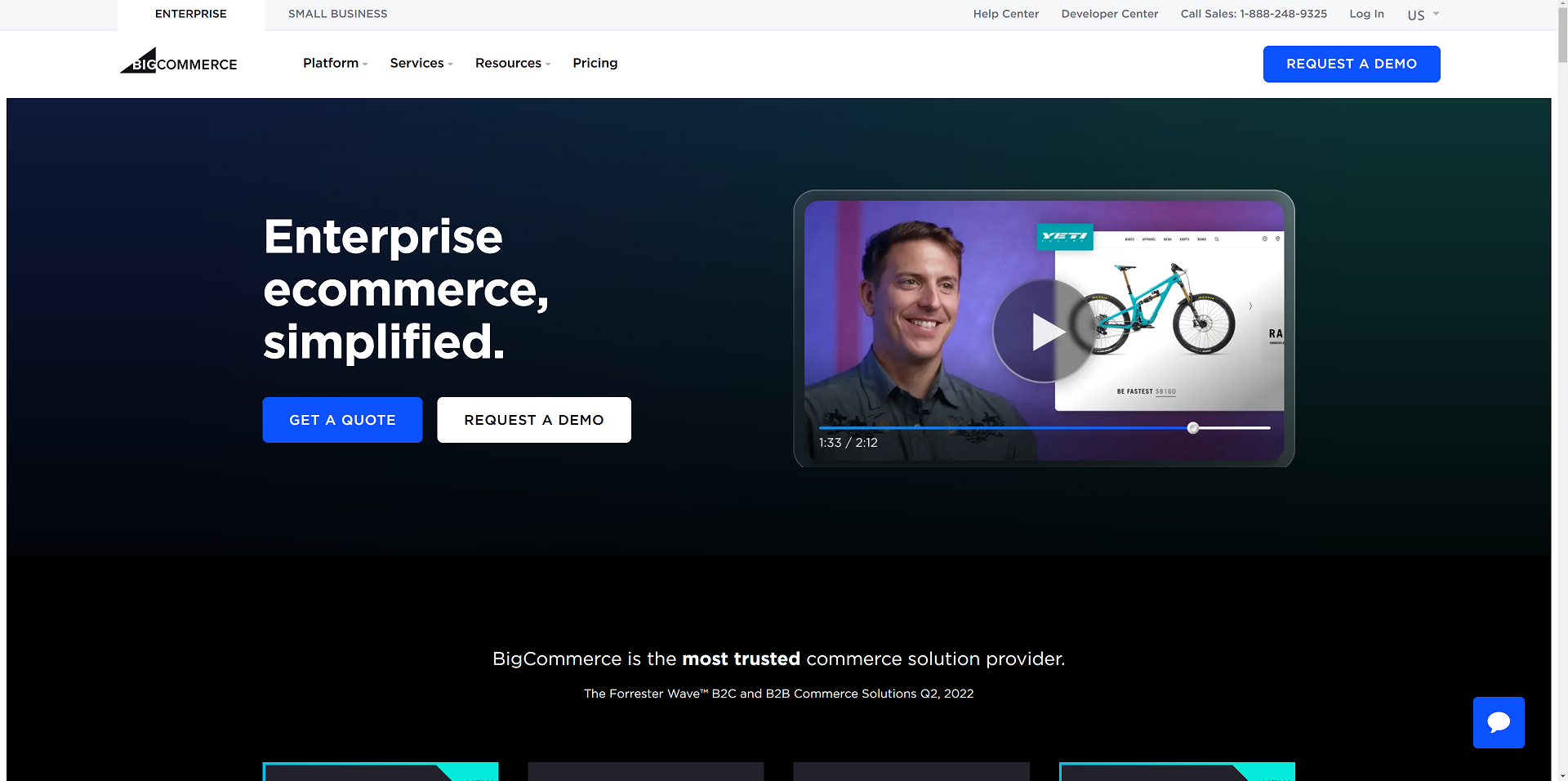 Screenshot of www.bigcommerce.com, November 2024
Screenshot of www.bigcommerce.com, November 2024BigCommerce is a hosted ecommerce platform best suited for businesses of all sizes looking to create and manage an online store. It caters to many users, from small and medium-sized businesses to large enterprises.
One of BigCommerce’s key advantages is its scalability. The platform accommodates businesses as they grow, offering features like unlimited products, file storage, and bandwidth.
BigCommerce also provides a range of advanced ecommerce functionalities, such as multi-channel selling, abandoned cart recovery, and built-in SEO tools, which can help businesses optimize their online sales performance.
When considering BigCommerce, it’s important to remember that while the platform offers a wide range of features, some of the more advanced functionalities may require a higher-tier plan or additional costs.
BigCommerce also enforces certain design limitations on its themes, which may restrict the level of customization available without diving into custom coding.
BigCommerce User Comments And Reviews
In its YouTube Review, Ecommerce Platforms said that BigCommerce is a very good and flexible platform, but mentioned issues with user-friendliness, revenue-based pricing, and the fact there is no native point of sale system.
On Reddit, users say that BigCommerce is much more robust and feature-complete “out of the box” than competitors like Shopify, and so the learning curve and pricing can be worth it for the right use case. However, they also note that Shopify is a much larger platform, meaning more apps with better features and often better user experience.
“BigCommerce blows Shopify out of the water in terms of base functionality – that’s why there’s not as many apps for it.
They’re simply not needed.” eCommerce-Guy-Jason on Reddit.
“BigCommerce doesn’t have all the app support/capability that Shopify does, i.e. app developers make apps first and foremost for Shopify, and then if they do BigCommerce at all they’re an afterthought…so, basically, Shopify has more apps. That’s something to consider if you rely on apps with your store.” usernames_suck_ok on Reddit.
Key Features:
- Full hosting solution.
- No software to self-install.
- Drag-and-drop visual builder.
- Extensions are available.
- Optimized for mobile.
- Blog module.
- Ecommerce store.
- Social media tools.
Pros:
- High level of customization options.
- Over 100 themes to choose from (including some free).
- No platform commission fees.
- Free subdomain available.
- Customer support.
Cons:
- No free version is available.
- No access to source code.
- Pricing is based on revenue, which isn’t great if you have tight margins.
15. Shopify
 Screenshot of shopify.com, November 2024
Screenshot of shopify.com, November 2024Shopify is an ecommerce platform well-suited for entrepreneurs and small business owners who want to establish an online presence quickly without extensive technical expertise.
Shopify’s extensive app marketplace allows businesses to extend its functionality and customize their online store to meet specific needs.
The platform also provides built-in features like inventory management, payment processing, and abandoned cart recovery to help streamline operations and optimize sales performance.
When using Shopify, consider the platform’s transaction fees, which vary depending on the payment gateway. Some advanced design changes may require HTML, CSS, and Liquid knowledge.
Despite these considerations, Shopify remains a top choice for businesses seeking a reliable, scalable, and feature-rich ecommerce platform.
Shopify User Comments And Reviews
In its YouTube review, WebsiteBuilderExpert said that Shopify has great tools, apps, and sales features, but relies heavily on 3rd-party apps and doesn’t have much creative customization without paying additional money.
In its YouTube Review, MyWifeQuitHerJob said that Shopify is a good and safe pick, however it has some expensive drawbacks.
On Reddit, users have mixed feelings and opinions on Shopify. Many users have had unpleasant or inconsistent experiences with support. However, others say that for most use cases, Shopify has everything you need.
“i’ve been in e-commerce for over a decade. use Shopify. it is by far the most powerful and feature-rich tool on the market for a merchant. between the APIs, rich ecosystem, constant improvements, etc, there are so many tools and stories accounted for centering around being a merchant. it’s easy to generated PnLs, run inventory audits, chargeback statuses, etc.” kupppo on Reddit.
“Again, reached Shopify Support. I kindly asked them to disable image resizing from my theme’s code. They told me to wait while they “take a look at it.” Much later, the response was: “Our team seems to be unable to work on this. Consider hiring a Shopify expert!” LuckySevenLeather on Reddit.
Key Features:
- Full hosting solution.
- No software to self-install.
- Drag-and-drop visual builder.
- Extensions are available.
- Optimized for mobile.
- Blog module.
- Ecommerce store.
- Social media tools.
Pros:
- All-in-one website builder and platform.
- Premade designs and templates.
- Free subdomain available.
- Customer support.
Cons:
- No free version is available.
- No access to source code.
- Platform commission fees.
16. Magento
 Screenshot of business.adobe.com/products/magento/magento-commerce.html, November 2024
Screenshot of business.adobe.com/products/magento/magento-commerce.html, November 2024Magento is an open-source ecommerce platform best suited for medium to large enterprises with complex online selling needs.
Magento’s flexibility and scalability come with a steeper learning curve than other ecommerce platforms. It requires more technical expertise to set up, customize, and maintain, making it less suitable for small businesses or users without web development knowledge.
When using Magento, remember that its powerful features and customization options can impact website performance if not optimized properly.
Choosing a reliable hosting provider and working with experienced Magento developers is crucial for ensuring optimal store performance and security.
Magento User Comments And Reviews
In its YouTube review, Capterra said that Magento has attractive pricing and a straightforward migration experience, but that the platform leaves something to be desired for SEO.
On Reddit, users note that Magento 2 was a significant improvement with better stability and support. There’s a lot of frustration with the platform on Reddit, and many negative comments, but people who have specific, complex use cases like Magento for its advanced use cases.
“Magento2 has made great strides to stability in the last 18 months, and now with a solid, reliable support lifecycle that takes the bite out of what was becoming a painful upgrade cycle.” tomdopix on Reddit.
“Shopify has done an awesome job of being the perfect platform for cookie-cutter e-commerce, and it a no brainer for many merchants who don’t need anything outside the norm. As someone who works almost exclusively with Magento/Adobe Commerce, it has meant that we now more frequently see more exciting use cases for Magento.” tomdopix on Reddit.
Key Features:
- Option to pay for Magento Commerce for a complete hosting platform or download the free, open-source software to install on your web server.
- Drag-and-drop visual builder.
- Extensions are available.
- Optimized for mobile.
- Ecommerce store.
- Social media tools.
Pros:
- All-in-one ecommerce platform or open-source ecommerce software package.
- Free version available.
- Designed for large-scale ecommerce.
- Premade designs and templates.
- Free subdomain available (mainly for setup and testing purposes).
- Customer support (paid version only).
- Access to source code with the downloadable version.
Cons:
- No blog module, although you can add it as an extension.
- Not optimized for web projects or website purposes outside of ecommerce.
- The steep learning curve for inexperienced users.
- A large investment for small-scale ecommerce.
17. PrestaShop
 Screenshot of prestashop.com, November 2024
Screenshot of prestashop.com, November 2024PrestaShop is an open-source ecommerce platform best suited for small- to medium-sized businesses looking for a cost-effective and customizable solution.
PrestaShop offers a wide range of themes and modules, allowing businesses to customize their online store’s appearance and functionality. The platform also has a strong community of developers and users, providing support and resources for store owners.
While PrestaShop is generally easy to use, some advanced customizations may require coding knowledge. Additionally, the number of installed modules can impact the platform’s performance.
PrestaShop User Comments And Reviews
In its YouTube video review, Capterra gave PrestaShop 5 stars, mentioning how easy it was to onboard.
User comments on Reddit are not quite so positive. In one post, a user asks why the platform doesn’t get much attention, and commenters have no shortage of reasoning:
“I have been using [PrestaShop] for 4+ years as I felt WooCommerce had some issues. And it has worked well for all that time. Yea the marketplace kindof sucks and you have to keep paying yearly for themes and plugins but they are somewhat well maintained.” Jackster22 on Reddit.
Key Features:
- Customizable to your needs, including themes and features.
- Includes backend tools like payments, shipping and data.
- Community of translators for multilanguage digital stores.
- Secure payment modules.
- Scalable.
- Includes demographic assistance.
Pros:
- Free version available.
- Open source so that you can customize your site to your needs.
- 5,000+ themes, modules, and services are available with the premium plan.
- Excellent user experience.
Cons:
- Limited scalability.
- No support team.
- Initial setup requires some programming knowledge.
18. OpenCart
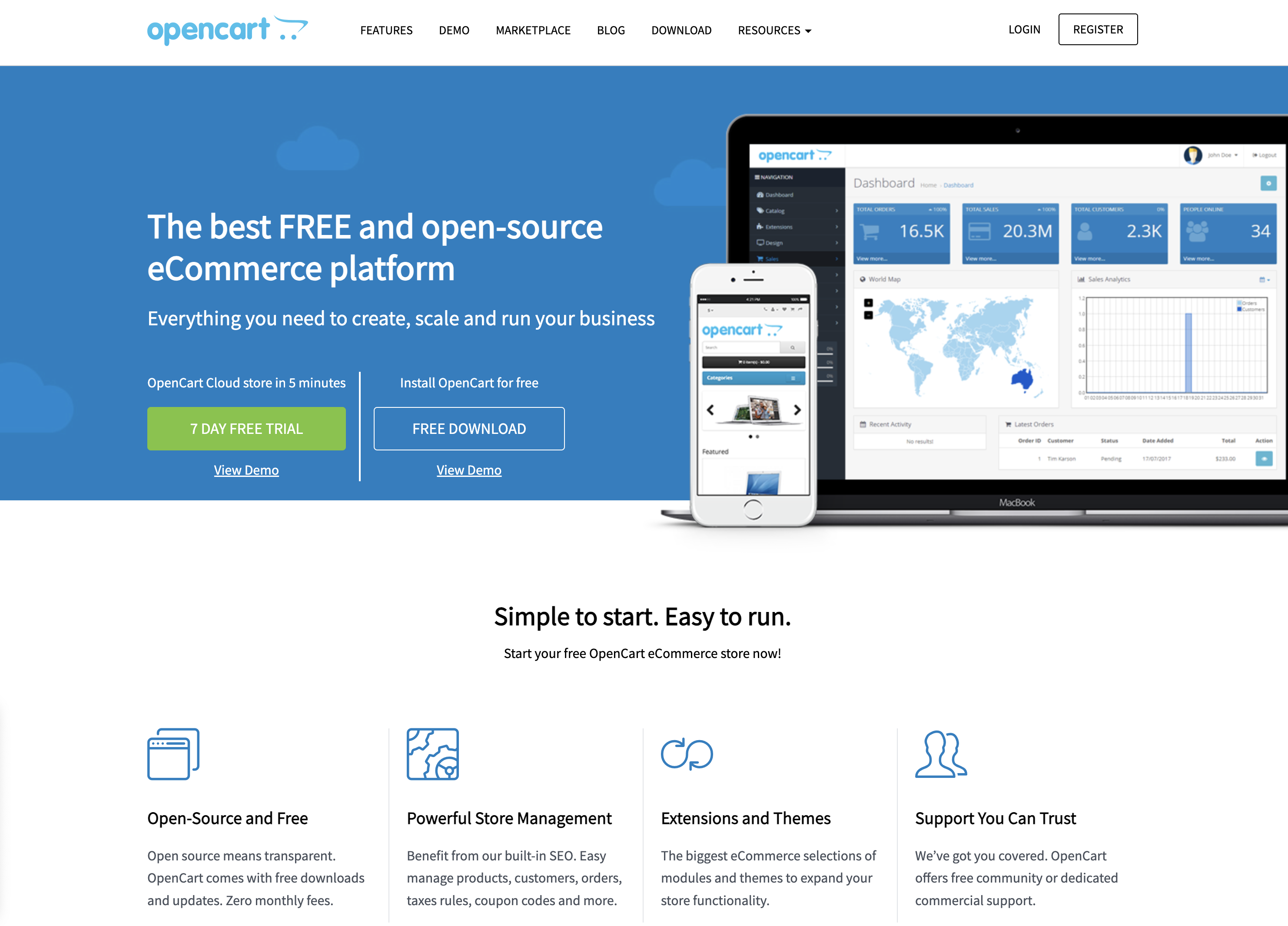 Screenshot of opencart.com, November 2024
Screenshot of opencart.com, November 2024OpenCart is a free, open-source ecommerce platform best suited for small- to medium-sized businesses with limited budgets.
OpenCart offers a decent range of features and extensions, allowing businesses to customize their online store. However, its marketplace is smaller than other platforms, which may limit advanced functionality options.
When using OpenCart, be mindful of its performance limitations as the store grows. Optimizing and carefully selecting extensions may be required to maintain a smooth user experience.
Additionally, its simplicity may not be suitable for businesses with complex ecommerce needs.
Features:
- The administrator dashboard gives you information at a glance.
- User management allows you to assign permissions and separate access.
- Allows you to run multiple stores from one dashboard.
- Customizable variables let you include options for sizes, colors, or anything else.
Pros:
- The platform is entirely free, as are many add-ons.
- Extensive metrics and reports were provided.
- Works with your current payment gateway.
- Comes with dedicated technical support.
- Flexible.
Cons:
- Often creates duplicate pages, which can cause SEO problems.
- Not all extensions, modules, plugins, and add-ons work well together.
- Checkout can be slow, particularly if you have numerous plugins.
- Can be difficult to import a list of inventory.
- Requires some degree of technical ability for optimal use.
Blogging Platforms
19. Medium
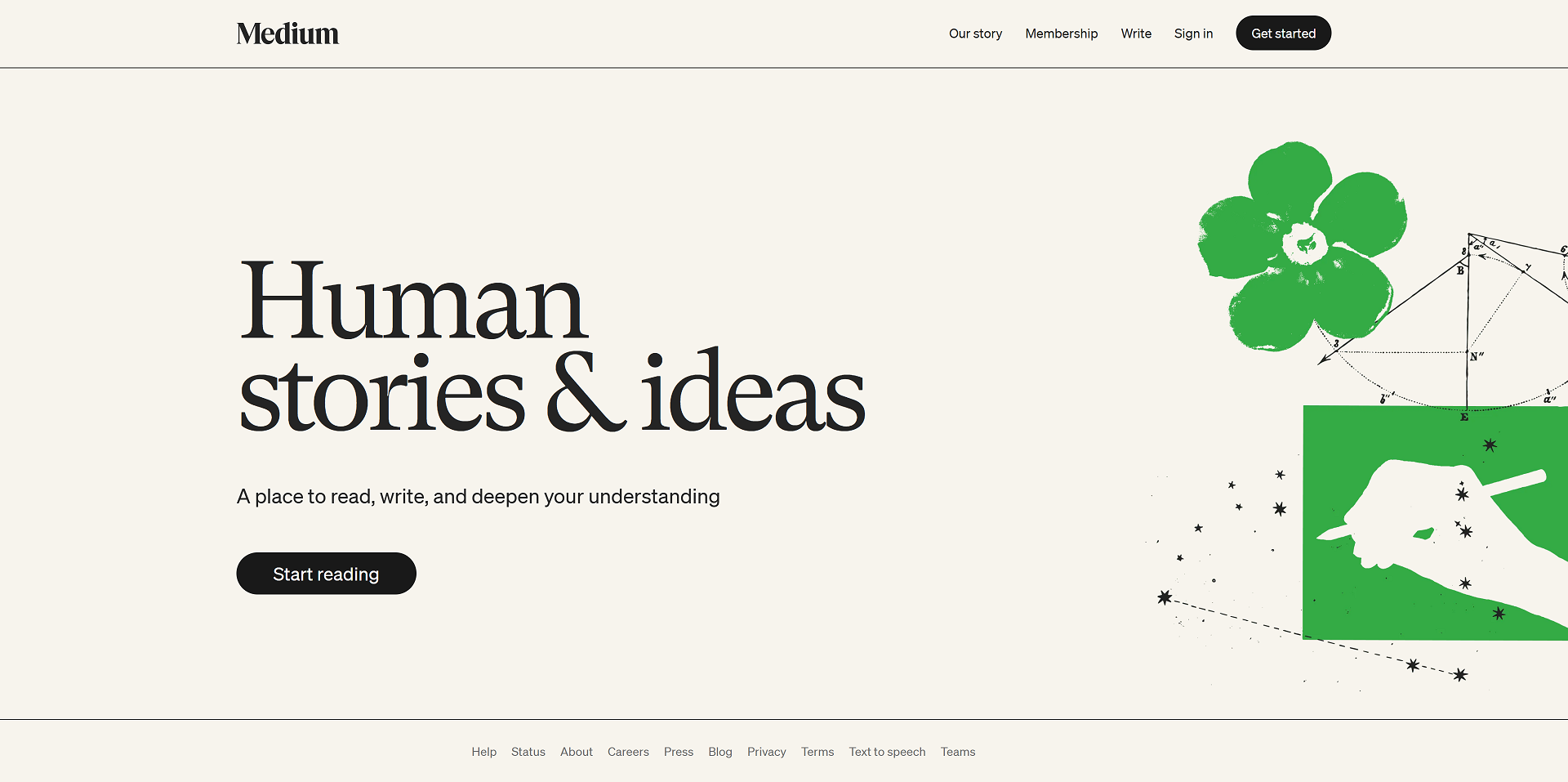 Screenshot of medium.com, November 2024
Screenshot of medium.com, November 2024Medium is a publishing platform best suited for individual bloggers, writers, and content creators who want to share their ideas and stories with a built-in audience.
Medium’s clean and minimalistic interface allows readers to concentrate on the content. The platform also offers a built-in social network, making it easy for writers to connect with readers and other creators.
However, this simplicity comes with limited customization options for branding and design.
When using Medium, it’s important to understand that the platform controls the distribution and monetization of content. While this can lead to increased exposure, it also means less control over the presentation and ownership of your content compared to self-hosted solutions.
Key Features:
- Full hosting solution.
- No software to self-install.
- Optimized for mobile.
- Blog module.
- Limited social media tools.
Pros:
- A community site for blogs.
- Free version available.
- Medium Partner Program to earn revenue.
- Customer support.
Cons:
- No extensions.
- No ecommerce stores.
- No premade designs or themes.
- No free subdomains.
- No third-party extensions.
- No access to source code.
20. Ghost
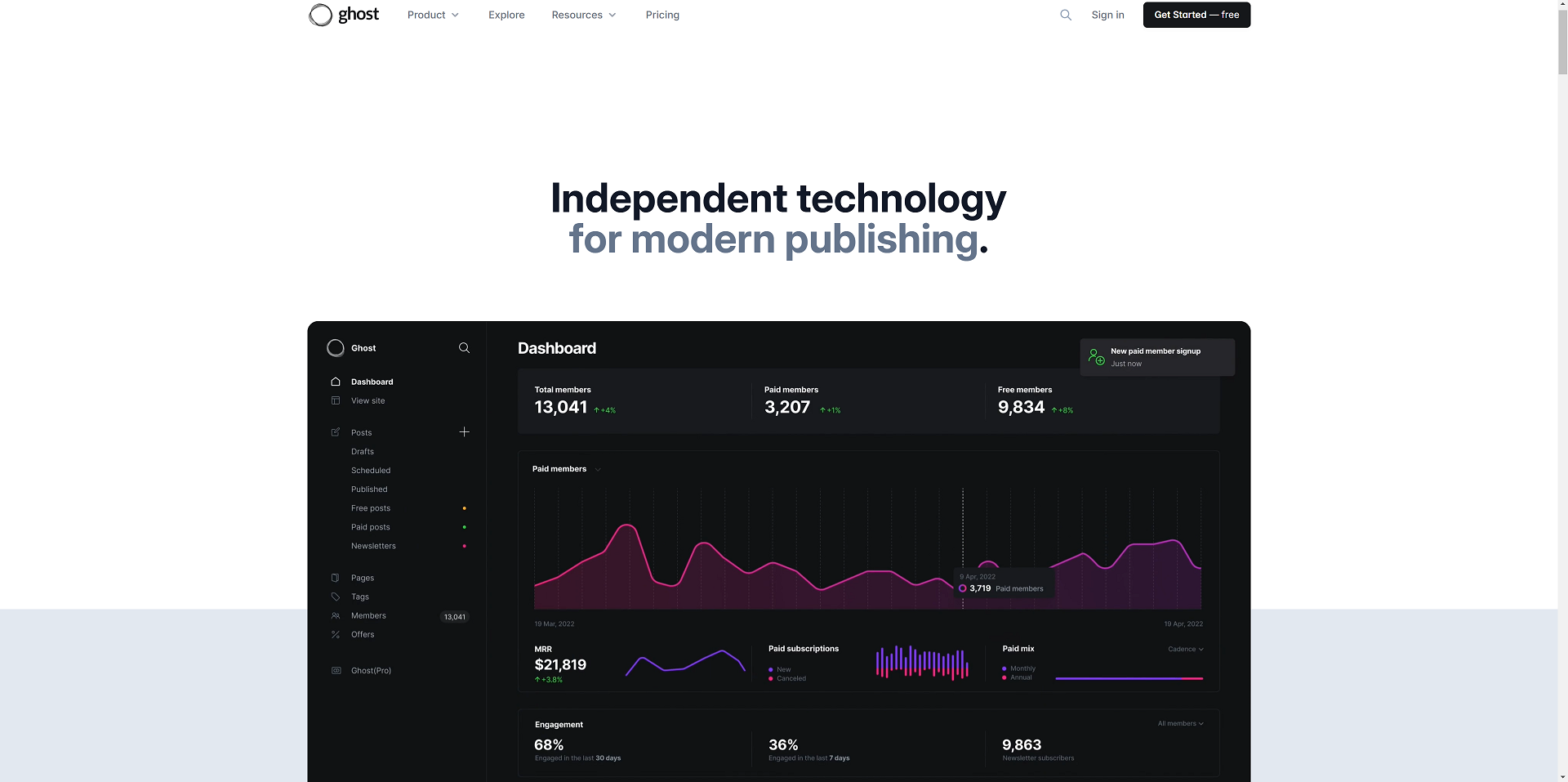 Screenshot of ghost.org, November 2024
Screenshot of ghost.org, November 2024Ghost is a lightweight, open-source publishing platform best suited for bloggers, writers, and small publications who value simplicity and performance.
It’s designed for users who want a clean, focused writing experience without the complexity of more feature-rich CMS platforms.
Ghost offers a simple, intuitive editor and a minimalistic default theme, allowing users to create and publish content quickly.
The platform also provides built-in SEO features and supports memberships and subscriptions, making it a good choice for content creators looking to monetize their work.
As Ghost primarily focuses on publishing, it may not be the best fit for users who require extensive customization options or advanced functionality beyond blogging.
Key Features:
- You can subscribe through Ghost’s hosting platform or download the free, open-source software to install on your web server.
- Basic drag-and-drop visual builder.
- Extensions are available through integrations with other tools.
- Optimized for mobile.
- Blog module.
- Ecommerce store (subscription only).
- Social media tools.
Pros:
- All-in-one website builder and platform.
- Free version available.
- Premade designs and templates.
- Free subdomain available with the paid version.
- Customer support.
- Access to source code.
Cons:
- Not compatible with all third-party web hosts.
- Highly specialized with limited capabilities beyond blogging.
- Not built to scale up into a business site or complex website.
21. Tumblr
 Screenshot of Tumblr.com, November 2024
Screenshot of Tumblr.com, November 2024Tumblr is a microblogging and social networking platform best suited for younger audiences who enjoy sharing short-form multimedia content.
Tumblr’s emphasis on community and content discovery makes it easy for users to connect with others who share similar interests. The platform’s reblogging feature spreads content quickly, increasing visibility and engagement.
When using Tumblr, it’s important to understand the platform’s unique culture and demographics. Tumblr is known for its diverse, often niche communities, which can be both a strength and a challenge for brands and marketers.
Additionally, while Tumblr offers some customization options, it may not be the best choice for users who require a highly professional or branded online presence.
Key Features:
- Features strong social media functionality.
- Customizable.
- Google Analytics Integration.
- Unlimited storage.
- Ad-free blog themes.
- Free SSL certification.
Pros:
- Free to use; no upgrades are required to access all features.
- Free web hosting.
- User-friendly and easy to set up.
- No storage limits.
- Can post audio, video, images, gifs, and more.
Cons:
- Daily posting limit (250/day).
- Files must be under 10 MB.
- No plugins.
- Safety and security leave something to be desired.
- Unsuited to long-form content.
22. Blogger
 Screenshot of Blogger.com, November 2024
Screenshot of Blogger.com, November 2024Blogger is a free, beginner-friendly blogging platform best suited for hobbyists, casual bloggers, and those who want to start a blog without investing in a self-hosted solution. It’s ideal for users who prioritize simplicity and ease of use over advanced customization options.
Blogger offers a straightforward, intuitive interface that makes it easy for users to create and publish blog posts.
The platform provides a selection of customizable templates and allows users to add gadgets and widgets to enhance their blog’s functionality. However, unlike other blogging platforms, Blogger’s design and customization options are relatively limited.
Blogger’s simplicity and lack of advanced features may make it unsuitable for professional bloggers or those looking to create a more sophisticated online presence.
Features:
- Clear analytics.
- Included layout/themes.
- Monetization options, including Google Adsense integration.
- Uses Google security.
- Unlimited storage.
Pros:
- Free to use.
- Extremely user-friendly.
- Free SSL security.
- Good uptime.
Cons:
- You don’t own your website.
- Fewer options and control over design.
- Limited support.
- Hard to port to a different platform.
Community Management
23. vBulletin
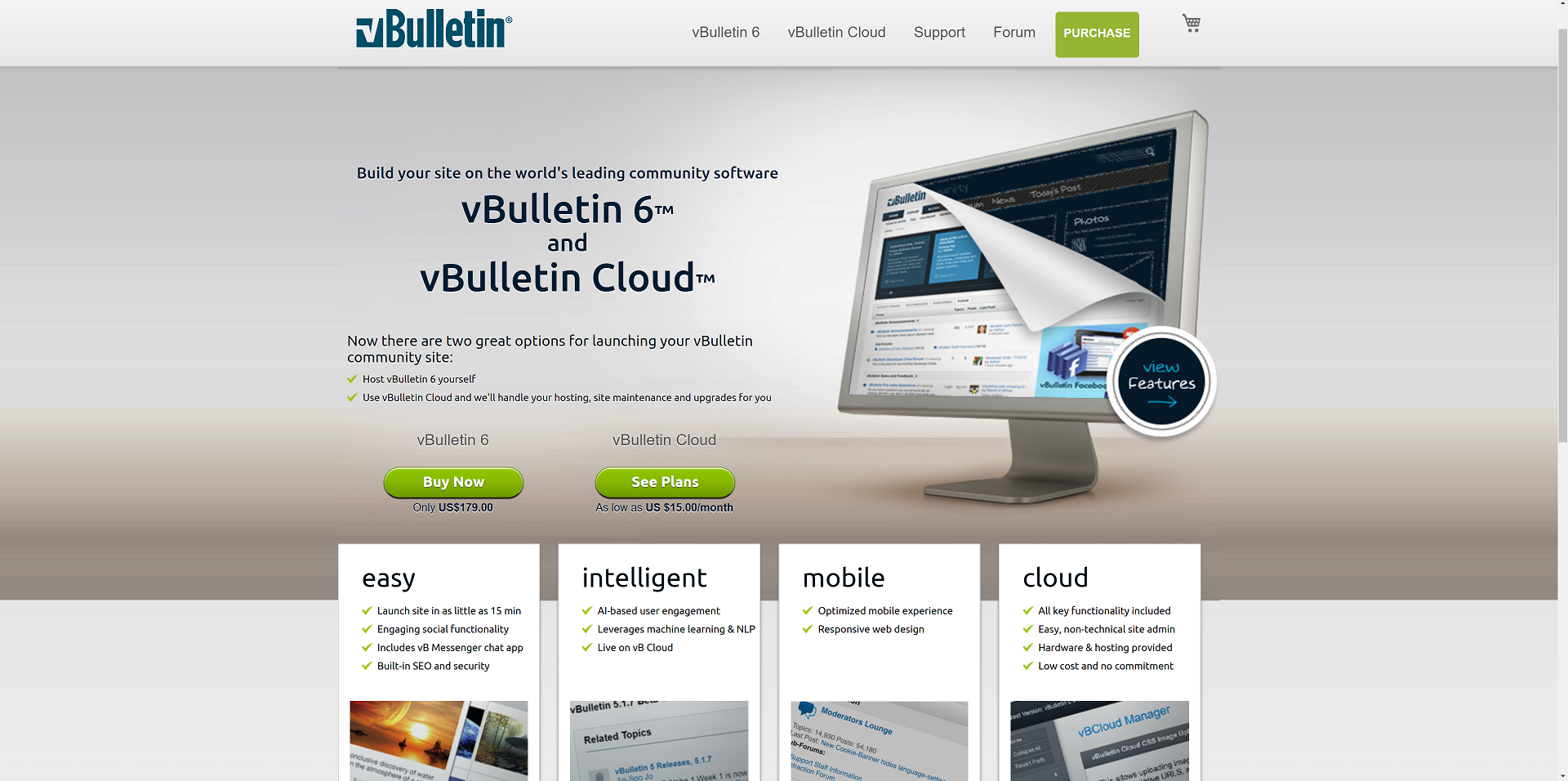 Screenshot of bulletin.com, November 2024
Screenshot of bulletin.com, November 2024vBulletin is a proprietary forum software best suited for businesses, organizations, and communities looking to create and manage an online discussion platform.
vBulletin offers many features, including private messaging, user groups, and content management tools, making it a powerful solution for managing large, active communities.
The platform also provides a high level of customization, allowing administrators to tailor the look and feel of their forum to match their brand or website.
One of the primary considerations when using vBulletin is its licensing cost, which can be a significant investment for some users.
Additionally, while vBulletin offers a range of customization options, some technical knowledge may be required to optimize and maintain the platform entirely.
Key Features:
- Built-in SEO and security.
- Includes a chat app.
- Easy to get started.
- Built-in applications.
- Optimized for mobile users.
- Blogging functionality.
- Fully customizable.
Pros:
- Frequent patches and bug fixes.
- Customer support.
- Easy to install and get started.
- Designed to host forums.
- Includes templates.
Cons:
- No free option.
- Limited features compared to some other platforms.
- Requires some tech skills to take full advantage of the functionality.
- It can’t customize code for the cloud-based version.
Why Consider A WordPress Alternative?
There are several reasons why someone might consider a WordPress alternative for their website:
- Specific needs: While WordPress is versatile, some websites may have particular requirements for which other platforms are better suited.
- Ease of use: Some users may find WordPress challenging, especially if they lack technical skills.
- Maintenance and security: As an open-source platform, WordPress requires users to handle updates, backups, and security measures themselves.
- Built-in features: Some alternatives come with built-in features that WordPress requires plugins for.
- Customization: While WordPress offers many customization options, some users may prefer platforms that allow more granular control over the website’s appearance and functionality.
- Simplicity: Other publishing platforms might be a better fit for users who want a simple platform to publish content without dealing with the complexities of managing a website.
How To Choose An Alternative To WordPress
Choosing the right WordPress alternative depends on your specific needs and goals. To help you make an informed decision, consider the following factors:
- Purpose of your website: Determine its primary purpose. Is it a blog, an online store, a portfolio, or a complex business website?
- Budget: Consider your budget for building and maintaining your website. Some alternatives are free, while others require a subscription or a one-time payment.
- Technical skills: Assess your technical skills and those of your team. Some alternatives are designed for users with little coding experience, while others may require more technical knowledge.
- Customization and flexibility: Evaluate how much control you want over your website’s appearance and functionality.
- Scalability: Consider your website’s potential for growth. If you anticipate a significant increase in traffic or content, choose a platform that can scale with your needs.
- Support and community: Look into the level of support and the size of the community surrounding each alternative.
- Hosting: Decide whether you prefer a self-hosted solution or a hosted platform.
- Features: List the features your website requires. Ensure that your alternative offers these features natively or through extensions.
Once you’ve considered these factors, research various WordPress alternatives and compare them based on your requirements.
Read reviews, explore user communities, and, if possible, test out the platforms through free trials or demos.
This will help you better understand how each alternative works and whether it aligns with your needs and expectations.
Which One Is Right For You?
With so many options, determining the right alternative to WordPress depends on your specific needs and goals.
For individuals and small businesses seeking an easy-to-use website builder, Wix, Squarespace, or Weebly offer intuitive drag-and-drop interfaces. Those prioritizing simplicity and speed may prefer static site generators like Jekyll or Hugo.
Developers and tech-savvy users who value flexibility and customization can explore headless CMS options like Contentful or more robust open-source platforms like Joomla and Drupal.
Ecommerce merchants must evaluate features like inventory management, payment processing, and scalability when choosing among Shopify, BigCommerce, WooCommerce, and others.
No matter your requirements, there is likely a WordPress alternative that is well-suited to your needs. Thoroughly assessing your website goals, budget, and technical abilities will help you select the right platform to build your ideal online presence.
With some research and planning, you can find the perfect alternative to take your website beyond what WordPress offers.
More resources:
Featured Image: Overearth/Shutterstock

